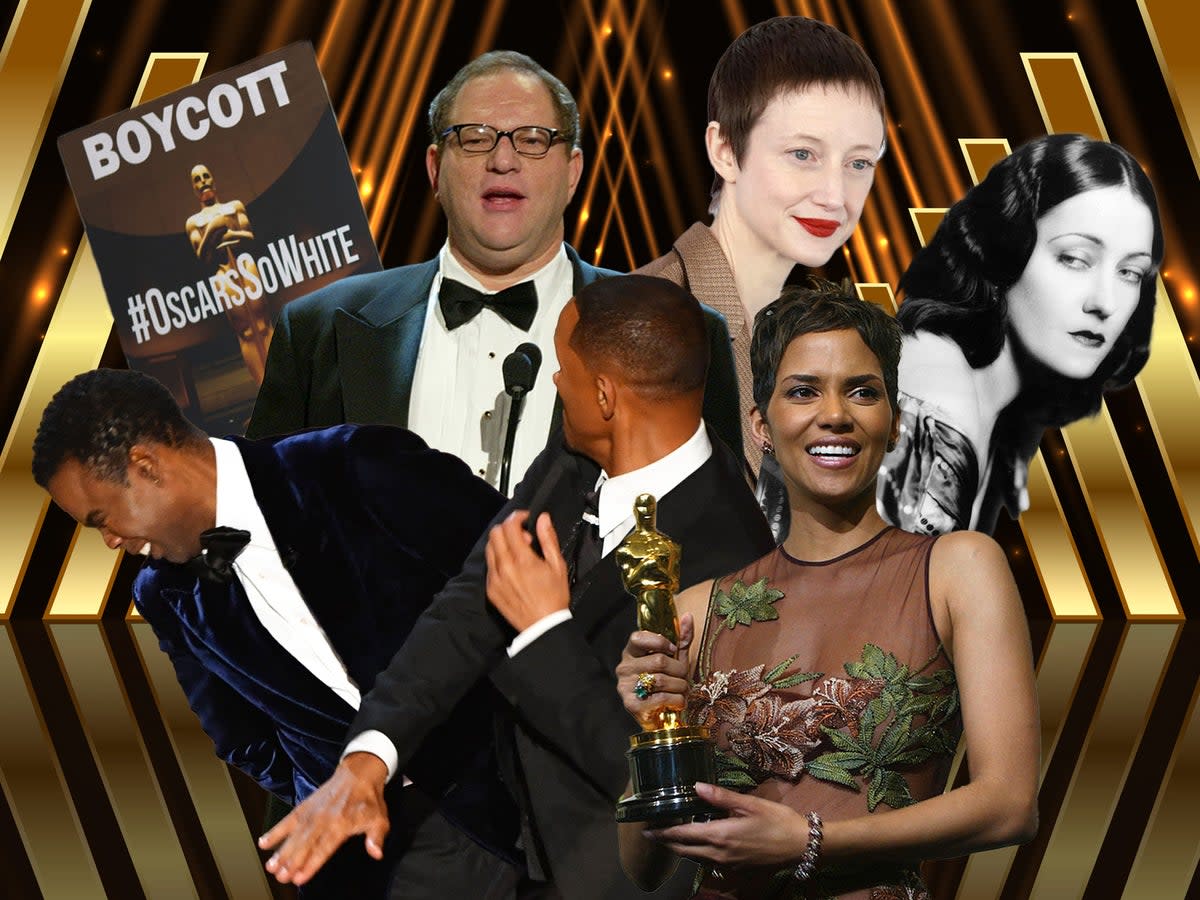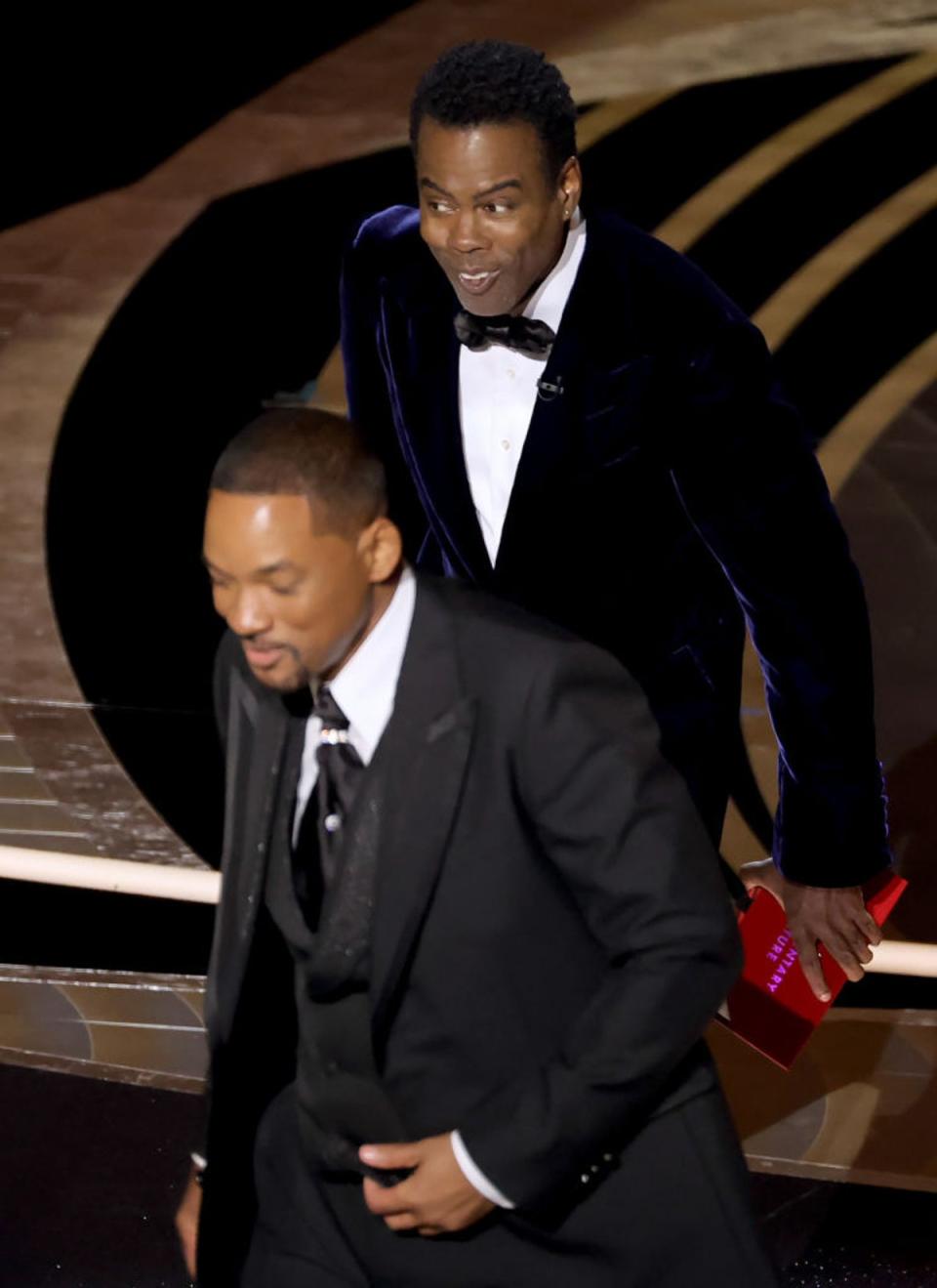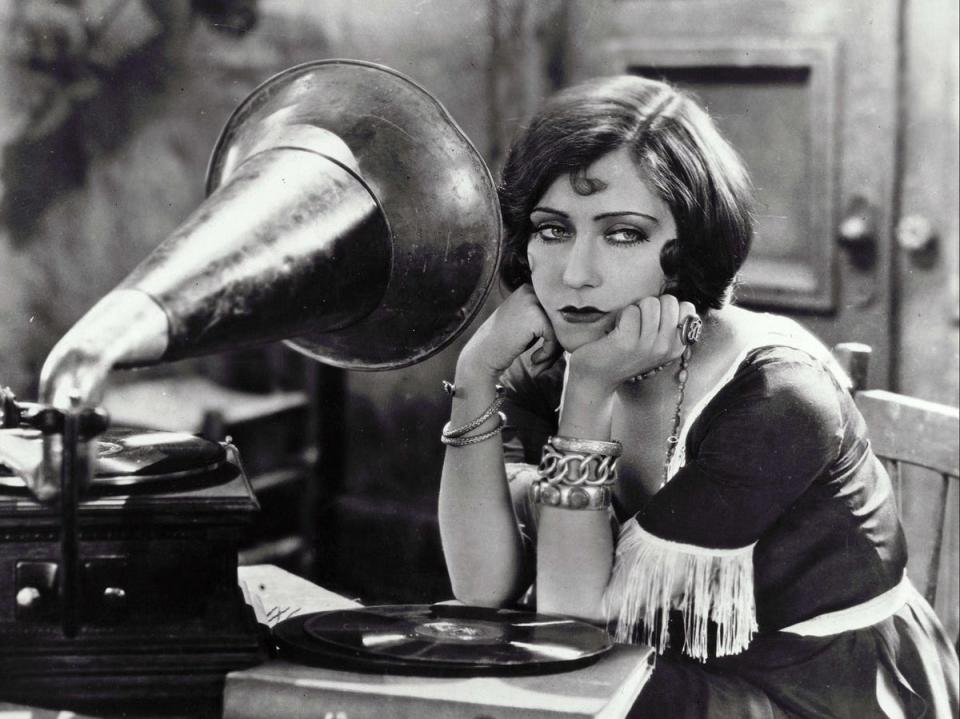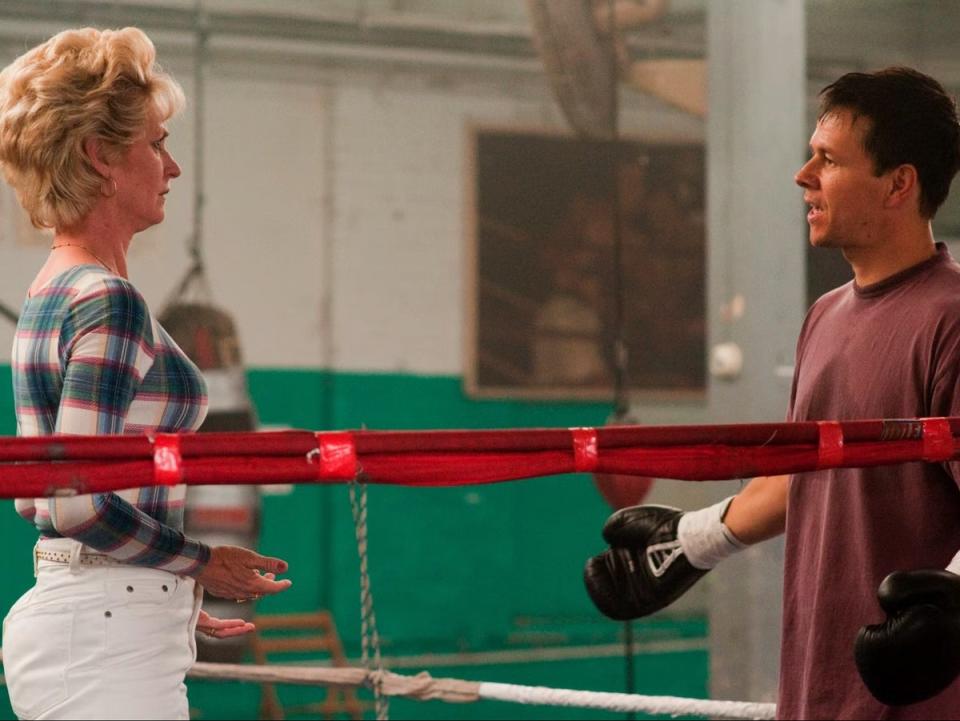Slapgate wasn’t a one-off – the Oscars have always been mired in scandal

- Oops!Something went wrong.Please try again later.
- Oops!Something went wrong.Please try again later.
They are not fair, they never have been and they never will be. The biggest misconception about the Academy Awards – happening for the 95th time this Sunday – is that they are an accurate or transparent measure of excellence or that the best movies always win.
We’re in an era of what seems unusual turbulence at the Oscars. Last year, there was “slapgate”, when actor Will Smith hit comedian Chris Rock on stage. That followed on from “envelopegate” in 2017, when the wrong film (La La Land) was declared Best Picture winner instead of Moonlight. This year, the #OscarsSoWhite controversy continues to rage more than 20 years after Halle Berry became the first, and so far only, Black woman to win a Best Actress Oscar for her performance in Monster’s Ball (2001).
Look back deep into Oscar history and you’ll find exactly the same turmoil. If they’d had hashtags and social media in the early years of the event, you might have found #OscarsSoAnti-Orson, after Citizen Kane was spurned controversially for the main awards in 1942. The #MeToo campaign against sexual harassment could just as well have been launched in the 1920s as in 2017.
“The Oscars have never been peaceful. They’ve always existed on various minefields,” says Michael Schulman, journalist and author of the new book Oscar Wars: A History of Hollywood in Gold, Sweat, and Tears.
You don’t have to step far into the Oscar story before you start stumbling on the bombs. At the end of the silent movie era in the late 1920s, Hollywood was mired in scandal. Memories hadn’t yet faded of the rape and manslaughter trials involving silent movie comedian Fatty Arbuckle a few years before. Nor had anyone forgotten the unsolved murder of leading silent movie director William Desmond Taylor. It was a period of extravagant decadence, whose excesses are covered in Damian Chazelle’s ill-fated recent Hollywood epic, Babylon (2022). The absence of that film from this year’s nominations in anything other than the craft categories suggests some in Hollywood don’t care to be reminded of such a seamy chapter in their history.
Organising body the Academy of Motion Picture Arts and Sciences (AMPAS) was founded in 1927 partly to clean the industry’s image up. The first awards were held in 1929. “Much of the country thought of Hollywood as a cesspool of sin,” Schulman says of the public perception of the film industry when the Oscars were launched.
The Academy had been founded not just to burnish the reputation of the industry but also to counteract the growing power of the unions. As film historian David Thomson wrote in his 2014 Vanity Fair essay Inside the Union-Busting Birth of the Academy Awards, MGM mogul Louis B Mayer regarded the Academy as “an organisation to handle labour problems without having to get into the union thing”.
“Anyone could see that it was an association for the people in power. Someone suggested awarding prizes,” said Thomson, pointing out that the Oscars were actually an afterthought. In the early years of the event, there were frequent disputes between the Academy and the unions and guilds. The latter continually threatened to boycott and sabotage the event.
Setting the trend that continues to this day, there was also chaos and confusion at the very first Academy Awards. The organisers couldn’t work out how to deal with The Jazz Singer (1927), starring Al Jolson. It was the first talkie and the other films in contention were silent. In the end, in what was to become time-honoured fashion, the issue was fudged and The Jazz Singer was given an honorary award instead of having to compete against movies made in a radically different fashion.

The inaugural Oscars was held just as Hollywood was going into one of its periodic tailspins. This was the first and only occasion in which silent movies won the major awards... at least until Michel Hazanavicius’s silent era-set 2011 comedy-drama, The Artist, picked up Best Picture. The studios were being forced to convert to sound and were being pushed near to bankruptcy by doing so. “That was a sign the industry realised this was a major upheaval,” says Schulman. “Everything Hollywood had been doing up to that point was about to go extinct. Many of the people who were winning awards that night were soon to be thrown on the trash heap awards.”
Back in 1929, there was a whiff of scandal about the first batch of Best Actress nominees too. Gloria Swanson was included for United Artists’ Sadie Thompson (1928), which told the story of the relationship between a prostitute and an intolerant and hypocritical missionary who falls prey to her charms and kills himself. It was adapted from a play – itself based on a Somerset Maugham story – which had been put on a list of titles banned from consideration for film treatment because they were considered too risque.
Rival studio bosses had tried to have the project stopped “at all costs”. It was on the grounds that making it would risk losing “for ourselves everything that we have gained in public respect and confidence for the past four or five years”, as they wrote in a furious telegram to United Artists about the efforts Hollywood had been making to clean up its image after the scandals of the early 1920s. Their moral indignation may also have been fired by jealousy. This was clearly a very commercial proposition. It went ahead, made a fortune at the box office and Swanson got her nomination, but she didn’t turn up at the Oscars.

“I don’t like the idea of competition among artists,” she observed. “If you were to say who’s a better actor, Doug Fairbanks or Charlie Chaplin, I would say I couldn’t tell you and you shouldn’t ask. They’re totally different... it would be like saying which is prettier, red or blue?”
Swanson was probably right – voting for one movie or performance over another was like comparing apples and oranges. The Oscars, though, very quickly caught on both with the industry and with the public.
“Personally, I have been an Oscars enthusiast since I was a kid but I also maintain a healthy irreverence toward the Academy Awards. They’re ridiculous and absurd. That is part of the fun of them. They are constantly making the wrong decisions and wild and crazy things happen like the envelope mix-up,” Schulman tells me. “I don’t think anyone should look to the Oscars as some kind of definitive barometer of cinematic worth. They always fail on that account.”
Schulman not only attends the event, covering it for The New Yorker magazine, but he also stages his very own show, You Like Me, in the run-up to the Oscars, at which professional actors and comedians reinterpret classic acceptance speeches.
Even seasoned Oscar enthusiasts like Schulman acknowledge that the event is now in another of its downward spirals. TV audiences have been slipping. They rose slightly last year after the nadir of 2021, the least watched broadcast ever, but there is little prospect of them emulating glory years like, say, 1998 when the televised event, dominated by James Cameron’s Titanic, had a record 87.50 million viewers in the US alone.

The viewing figures may be declining but the scandals and controversies keep on coming. This year, Andrea Riseborough’s Best Actress nomination for her bravura turn as the alcoholic mother in the low-budget movie To Leslie has proved especially contentious. There have been complaints about her stealthy, guerilla-style social media campaign that involved big-name celebrities endorsing her performance. Her success was blamed for pushing Black actors, Viola Davis, star of The Woman King, and Danielle Deadwyler, star of Till, off the nomination list.
Disgraced producer-distributor Harvey Weinstein is safely behind bars but many believe that his spirit lives on. When Weinstein was at the helm of Miramax in the late 1990s and early 2000s, he brought new levels of aggression and skulduggery into the Oscar race. He was accused of resorting to negative campaigning to undermine Steven Spielberg’s Saving Private Ryan (1998) and to promote Miramax’s own Shakespeare in Love (1998), which won the Best Picture award instead.
Schulman suggests “there are a lot of parallels between Netflix in the last 10 years and Miramax in the 1990s... minus the crazy Harvey Weinstein”.
The streaming giant’s awards department is headed by Lisa Taback, who, as the Hollywood Reporter wrote, “learned how to fight with her gloves off” as a strategist for Miramax on films like The English Patient (1996) and Shakespeare in Love.
Netflix has campaigned very aggressively for films ranging from Alfonso Cuaron’s 2018 contender, Roma, to this year’s hopeful, the German language anti-war film, All Quiet on the Western Front, directed by Edward Berger.

“Netflix has spent gobs of money trying to win Best Picture and it has repeatedly failed,” Schulman says. Last year, The Power of the Dog (2021) was pipped to the award by Apple’s Coda (2021).
There is still seemingly an undercurrent of resistance against, and resentment toward, Netflix, not least because the streamer’s films are seen so fleetingly in cinemas. What is apparent, though, is that almost every recent spat or scandal surrounding the Oscars currently has its precedents.
In 1960, long before Netflix or Miramax began revving up their Oscar campaigns, Chill Wills, co-star of John Wayne western The Alamo (1960) but best known for voicing 1950s comedy character Francis the talking mule, took out a series of ads in the trade press claiming the rest of the cast of Wayne’s movie were “praying” for him to win an Oscar because his acting was so “great”. Wills was being encouraged in his actions by his egregious publicist, WS “Bow-Wow” Wojciechowicz. Wayne was furious at their antics and took out his own ad denouncing his own star.
More recently, Melissa Leo was heavily criticised for placing glamour ads of herself in film trade magazines, trumpeting her own performance in David O Russell’s The Fighter (2010). Observers scoffed at her narcissistic, self-financed campaign but her tactics worked: she ended up winning the Best Supporting Actress Oscar.
The Academy has diversified its membership markedly since 2016, the year that #OscarsSoWhite went viral. The membership is more non-white, more female and more international. It’s unlikely that a South Korean movie like Parasite (2019) would have won Best Picture without the changes. Nor would there have been as many Asian nominees as there are this year, among them Hong Chau for The Whale and Michelle Yeo for Everything Everywhere All At Once.

Nonetheless, the glaring fact remains that no women have been nominated for Best Director this year; there has never been a Black Best Director winner.
Even if this ignominious record changes over the next year or two, the awards will continue to reflect the biases of those who greenlight the movies. Academy members can only choose among the films that are made – that’s where the real lack of diversity lies.
Oscar history is cyclical. What can also be predicted confidently is that the Academy Awards will never run completely smoothly, whatever improvements are made to their organisation. They were a very bumpy ride in 1929, and there is no sign that it will be safe for viewers to unfasten their seatbelts any time soon.
Michael Schulman’s book ‘Oscar Wars: A History of Hollywood in Gold, Sweat, and Tears’ is out now

